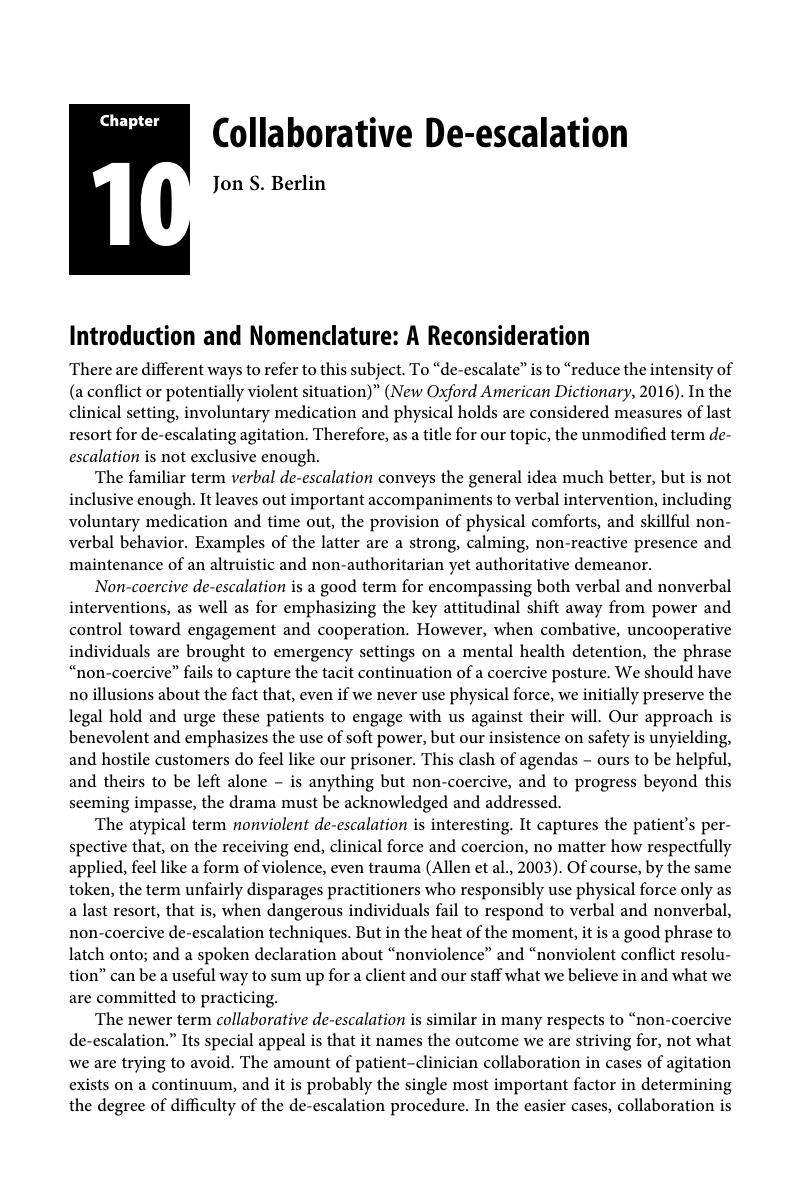Book contents
- The Diagnosis and Management of Agitation
- The Diagnosis and Management of Agitation
- Copyright page
- Dedication
- Contents
- Contributors
- Foreword
- Preface
- Chapter 1 Agitation: Where We’re Going, Where We’ve Been
- Chapter 2 The Biology of Agitation
- Chapter 3 Medical Evaluation of the Agitated Patient
- Chapter 4 Agitation Due to Substance Use, Abuse, and Withdrawal
- Chapter 5 Medical Causes of Patients with Agitation: Systemic Illness
- Chapter 6 Special Populations: Agitation in Elderly Patients
- Chapter 7 The Psychiatric Evaluation of Patients with Agitation
- Chapter 8 Psychiatric Causes of Agitation: Exacerbation of Personality Disorders
- Chapter 9 Psychiatric Causes of Agitation: Exacerbation of Mood and Psychotic Disorders
- Chapter 10 Collaborative De-escalation
- Chapter 11 Agitation in Field Settings: Emergency Medical Services Providers and Law Enforcement
- Chapter 12 Use of Force in the Prehospital Environment
- Chapter 13 Appropriate Use of Restraint and Seclusion
- Chapter 14 Pharmacologic Treatment of Agitation
- Chapter 15 Understanding the Environmental, Social, Familial, and Cultural Context of Agitation
- Chapter 16 The Ethics of Agitation: When Is an Agitated Patient Decisionally Capable?
- Chapter 17 Patient Rights, Patient and Family Perspectives on Agitation
- Chapter 18 Diagnosis and Management of Agitation in Children and Adolescents
- Index
- References
Chapter 10 - Collaborative De-escalation
Published online by Cambridge University Press: 09 March 2017
- The Diagnosis and Management of Agitation
- The Diagnosis and Management of Agitation
- Copyright page
- Dedication
- Contents
- Contributors
- Foreword
- Preface
- Chapter 1 Agitation: Where We’re Going, Where We’ve Been
- Chapter 2 The Biology of Agitation
- Chapter 3 Medical Evaluation of the Agitated Patient
- Chapter 4 Agitation Due to Substance Use, Abuse, and Withdrawal
- Chapter 5 Medical Causes of Patients with Agitation: Systemic Illness
- Chapter 6 Special Populations: Agitation in Elderly Patients
- Chapter 7 The Psychiatric Evaluation of Patients with Agitation
- Chapter 8 Psychiatric Causes of Agitation: Exacerbation of Personality Disorders
- Chapter 9 Psychiatric Causes of Agitation: Exacerbation of Mood and Psychotic Disorders
- Chapter 10 Collaborative De-escalation
- Chapter 11 Agitation in Field Settings: Emergency Medical Services Providers and Law Enforcement
- Chapter 12 Use of Force in the Prehospital Environment
- Chapter 13 Appropriate Use of Restraint and Seclusion
- Chapter 14 Pharmacologic Treatment of Agitation
- Chapter 15 Understanding the Environmental, Social, Familial, and Cultural Context of Agitation
- Chapter 16 The Ethics of Agitation: When Is an Agitated Patient Decisionally Capable?
- Chapter 17 Patient Rights, Patient and Family Perspectives on Agitation
- Chapter 18 Diagnosis and Management of Agitation in Children and Adolescents
- Index
- References
Summary

- Type
- Chapter
- Information
- The Diagnosis and Management of Agitation , pp. 144 - 155Publisher: Cambridge University PressPrint publication year: 2017
References
- 3
- Cited by



